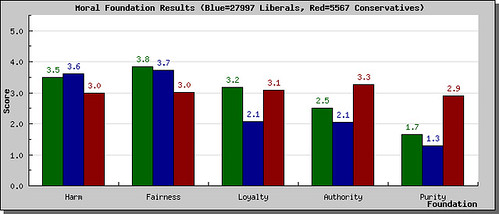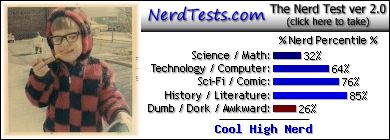---
Liberals and conservatives have highly different moral priorities. And we have to understand them both if we want to accomplish anything. This article is a good first step. A few excerpts:
In a creative attempt to move beyond red-state/blue-state clichés, Haidt has created a framework that codifies mankind's multiplicity of moralities. His outline is simultaneously startling and reassuring -- startling in its stark depiction of our differences, and reassuring in that it brings welcome clarity to an arena where murkiness of motivation often breeds contention.
He views the demonization that has marred American political debate in recent decades as a massive failure in moral imagination. We assume everyone's ethical compass points in the same direction and label those whose views don't align with our sense of right and wrong as either misguided or evil. In fact, he argues, there are multiple due norths.
Last September, in a widely circulated Internet essay titled Why People Vote Republican, Haidt chastised Democrats who believe blue-collar workers have been duped into voting against their economic interests. In fact, he asserted forcefully, traditionalists are driven to the GOP by moral impulses liberals don't share (which is fine) or understand (which is not).
Four years ago, he recalls, "I wanted to help Democrats press the right buttons because the Republicans were out-messaging them.
"I no longer want to be a part of that effort. What I want to do now is help both sides understand the other, so that policies can be made based on something more than misguided fear of what the other side is up to."
Haidt's framework of political morality can be traced back to a dispute between two important thinkers: Shweder, who would go on to become his mentor, and legendary Harvard psychologist Lawrence Kohlberg. In his 1981 volume The Philosophy of Moral Development: Moral Stages and the Idea of Justice (Essays on Moral Development, Volume 1), Kohlberg essentially argued that other moral systems are mere stepping-stones on a path that will eventually lead the entire world to embrace Western humanist values. Reviewing the book for the journal Contemporary Psychology, Shweder politely but effectively tore that notion apart.
Citing his extensive research on traditional Indian culture, Shweder pointed out the inconsistencies and lack of convincing evidence behind Kohlberg's arguments. Agreeing with philosopher Isaiah Berlin, Shweder asserted -- and continues to assert -- that a range of ethical systems have always coexisted and most likely always will. In a 1997 paper co-written with three colleagues, he broke down primal moral impulses into a "big three": autonomy, community and divinity.
"Morality is not just about how we treat each other, as most liberals think," he argues. "It is also about binding groups together and supporting essential institutions."
With all that in mind, Haidt identified five foundational moral impulses. As succinctly defined by Northwestern University's McAdams, they are:
• Harm/care. It is wrong to hurt people; it is good to relieve suffering.
• Fairness/reciprocity. Justice and fairness are good; people have certain rights that need to be upheld in social interactions.
• In-group loyalty. People should be true to their group and be wary of threats from the outside. Allegiance, loyalty and patriotism are virtues; betrayal is bad.
• Authority/respect. People should respect social hierarchy; social order is necessary for human life.
• Purity/sanctity. The body and certain aspects of life are sacred. Cleanliness and health, as well as their derivatives of chastity and piety, are all good. Pollution, contamination and the associated character traits of lust and greed are all bad.
Haidt's research reveals that liberals feel strongly about the first two dimensions -- preventing harm and ensuring fairness -- but often feel little, or even feel negatively, about the other three. Conservatives, on the other hand, are drawn to loyalty, authority and purity, which liberals tend to think of as backward or outdated. People on the right acknowledge the importance of harm prevention and fairness but not with quite the same energy or passion as those on the left.
"I see liberalism and conservatism as opposing principles that work well when in balance," he says, noting that authority needs to be both upheld (as conservatives insist) and challenged (as liberals maintain). "It's a basic design principle: You get better responsiveness if you have two systems pushing against each other. As individuals, we are very bad at finding the flaws in our own arguments. We all have a distorted perception of reality."
In his quest to "help people overcome morally motivated misunderstandings," Haidt has set up a couple of Web sites, www.civilpolitics.org and www.yourmorals.org. At the latter, you can take a quiz that will locate you on his moral map. For fun, you can also answer the questions you think the way your political opposite would respond. Haidt had both liberals and conservatives do just that in the laboratory, and the results are sobering for those on the left: Conservatives understood them a lot better than they understood conservatives.
I suggest reading the whole article, as well as following the links and reading them. It's facinating stuff...
Took that morality quiz, too...
Here are my results:

read more | digg story





















.gif)






No comments:
Post a Comment